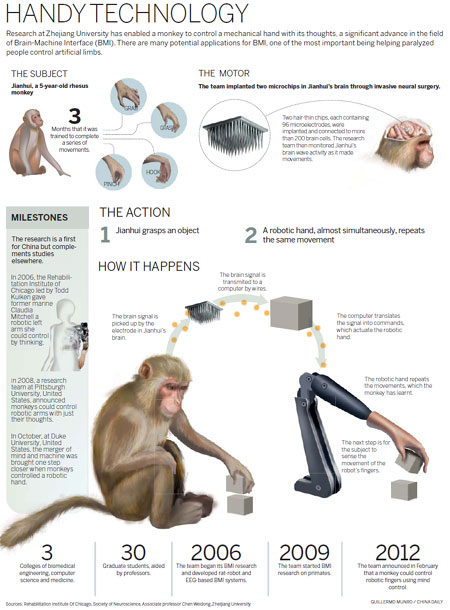Monkey see, monkey do
Updated: 2012-04-11 09:53
By Xu Junqian (China Daily)
|
|||||||||||

Pioneering research in which a monkey controls a mechanical hand offers hope to those needing artificial limbs. Xu Junqian reports.
 |
It's 10 am and Jianhui, wearing a creamy yellow nightcap, is in a cubicle separated from a computer-filled lab in Zhejiang University. Jianhui stretches a hairy and slender arm to grasp the cylinder ring in front, while a robotic hand, almost simultaneously, repeats the same movement just a few steps away.
Jianhui is a 5-year-old rhesus monkey. For the past three months, since arriving from a monkey farm and having microelectrodes implanted in its brain, Jianhui has been trained to complete a series of movements including grabbing, grasping, pinching and hooking.
But this is not a circus show. The training was part of a biomedical research program at Qiushi Academy for Advanced Studies of Zhejiang University in Hangzhou.
And it is thought this research, successfully applied to humans, could help millions of paralyzed people control artificial limbs, as if they were their own.
"It's just like Avatar," claims lead researcher Zheng Xiaoxiang, a biomedical engineering professor at Zhejiang University.
"The creatures on Pandora can simply recharge by connecting their long braids to those magical trees. Similarly, paralyzed people will be able to move robotic arms with just their thoughts if their brains have these 'braid' implants," she says.
The research is a first in China but complements studies elsewhere.
In 2008, a research team at Pittsburgh University, United States, announced monkeys had controlled robotic arms with just their thoughts.
In October, at Duke University, United States, the merger of mind and machine was brought one step closer when monkeys controlled a robotic hand.
The Zhejiang University team made further progress in February when it announced that a monkey could control a robotic hand through mind control.
"The basic theory is similar, but when it comes to the hand, the signals are more difficult and subtle to process, and thus the whole process is more complicated," Zheng says.
After the animals were trained and two hair-thin chips, each containing 96 microelectrodes, were implanted and connected with more than 200 brain cells, the research team could monitor their brain activity.
By collecting and analyzing the microelectrode signals, the patterns of the movement were learned and the computerized mechanical hand could respond to the signals.
"There are tens of thousands of brain cells to control the hand. We can decode the activity of a hand by studying 200 or so brain cells. But of course, the activities reproduced by us with a mechanical hand are far less than a real hand," Zheng says.
"There is still a long way to go, but this is a significant step," she says of the work done by a team of 30 graduate students, aided by computer science, biology and neurology department professors, who spent five years improving what is known as "Brain-Machine Interface".
Once applied to human beings, the technology could help a car accident victim walk again even if their spine is severely injured.
"The next thing we are focusing on is the monkey connecting the arm with the hand," Zheng says. "We started with rats and are now working on Jianhui and other monkeys."
Yu Hongbo, a professor at the School of Life Science, Fudan University, says the Zhejiang University study is groundbreaking.
"The project is not only scientifically innovative, but also features bioengineering that requires stability and feedback mechanisms," he says.
For example, when the mechanical hand grabs a glass of water, it has to send back information about how much the glass and water weighs so that the brain can calibrate how much power is used.
"It's a good beginning, since China was rather falling behind in this area. But there's a long way to go," Yu says.
Contact the writer at xujunqian@chinadaily.com.cn.
Zhang Jianmin contributed to the story.
Related Stories
The Science Of Yoga 2012-02-14 11:19
Museums show off popularization potential 2012-03-21 14:15
Making science pop 2012-03-21 14:00
Truth or dare 2011-08-05 13:59
Tradition and science brighten up dining scene 2011-08-28 15:48
Today's Top News
Rescuers race against time for quake victims
Telecom workers restore links
Coal mine blast kills 18 in Jilin
Intl scholarship puts China on the map
More bird flu patients discharged
Gold loses sheen, but still a safe bet
US 'turns blind eye to human rights'
Telecom workers restore links
Hot Topics
Lunar probe , China growth forecasts, Emission rules get tougher, China seen through 'colored lens', International board,
Editor's Picks

|

|

|

|

|

|





